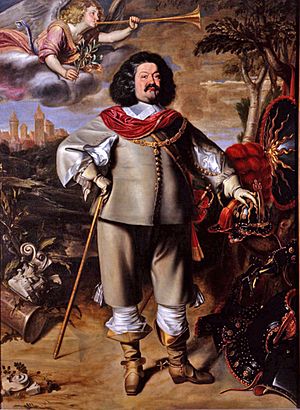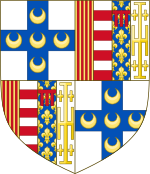Ottavio Piccolomini facts for kids
Quick facts for kids
Ottavio Piccolomini
|
|
|---|---|

Portrait of Ottavio Piccolomini by Anselm van Hulle, Collezione Luca Cristini
|
|
| Born | November 11, 1599 Florence, Grand Duchy of Tuscany |
| Died | 11 August 1656 (aged 56) Vienna, Austria |
| Allegiance | |
| Years of service | 1616–1656 |
| Rank | Generalfeldmarschall |
| Battles/wars | Thirty Years' War
|
| Awards | Order of the Golden Fleece |
| Spouse(s) | Maria Benigna Francisca of Saxe-Lauenburg |
Ottavio Piccolomini (born November 11, 1599 – died August 11, 1656) was an important Italian nobleman and military leader. He started his career serving Spain and later became a high-ranking general, known as a field marshal, for the Holy Roman Empire. He played a big part in the Thirty Years' War, a major conflict in Europe.
Contents
Early Life and Military Beginnings
Ottavio was born in Florence, Italy. His family, the Piccolominis, was very famous in Siena and even had two popes from their family! From a young age, Ottavio learned about military life. When he was almost 17, he joined the Spanish army as a pikeman, a soldier who uses a long spear.
In 1618, the Thirty Years' War began. This was a huge war that involved many countries in Europe. Ottavio was made a captain in a cavalry (horseback soldiers) unit. This unit was sent from Tuscany to help the army of the Holy Roman Emperor. He fought bravely in the Battle of White Mountain in 1620 and later in Hungary.
In 1624, Ottavio briefly served the Spanish army again during the Siege of Breda. A siege is when an army surrounds a city or fort to try and capture it. After that, he became a lieutenant-colonel in a cuirassier (heavy cavalry) unit in Italy. By 1627, he was back with the Imperial army as a colonel and captain of the personal guards for Albrecht von Wallenstein, a very powerful general. Ottavio faced some trouble for trying to get money from people in Stargard, but he showed he was sorry and was soon given command of both cavalry and infantry (foot soldiers).
Ottavio's brother, Ascanio Piccolomini, became the Archbishop of Siena in 1628. This helped Ottavio become important in diplomacy, which is about how countries talk to each other. Wallenstein often used Ottavio's skills in talking and planning secret missions.
Fighting in the Thirty Years' War
In 1630, Gustavus Adolphus, the King of Sweden, invaded Germany. Ottavio couldn't return to Germany right away because he was held as a hostage in Italy until 1631. This was to make sure a peace treaty, which ended the Mantuan War, was followed.
Even though he supported Wallenstein, Ottavio wasn't promoted when the war against Sweden continued. He then served as a colonel under another general, Heinrich Holk, in the Battle of Lützen in 1632. During this battle, Ottavio showed incredible bravery. He led many cavalry charges against the Swedish army. Five of his horses were shot from under him, and he was hit six times by musket balls, but his armor protected him.
Leading the Imperial Army
Ottavio's bravery at Lützen was noticed. The emperor promoted him to General-Feldwachtmeister, which is like a major-general. In 1633, he was put in charge of a group of soldiers in Bohemia to stop the enemy from advancing.
Ottavio didn't agree with Wallenstein's plans, so he joined a secret group of military leaders who wanted Wallenstein removed. In 1634, Emperor Ferdinand II dismissed Wallenstein. Ottavio was involved in the events that led to Wallenstein's death. For his part, Ottavio was rewarded with a high military rank (marshal's baton), a lot of money, and land.
Key Victories and Rewards
In September 1634, Ottavio was a hero at the Battle of Nördlingen. After this battle, he led his own troops for the first time and successfully pushed the Swedish and their allies out of Franconia.
From 1635 to 1639, Ottavio commanded an Imperial army that helped Spain in the Southern Netherlands and Northern France. He won many battles but often felt he didn't get enough help from the Spanish. In 1636, his troops helped the Spanish attack France. They crossed the Somme River and captured the important fortress of Corbie. Ottavio wanted to push further towards Paris, but the Spanish leader decided to stop the attack.
Ottavio also helped break French sieges, like at Saint-Omer in 1638 and especially at Thionville in 1639, where he won a huge victory. For his successes, he was made a Count of the Empire in 1638. In 1639, the King of Spain, Philip IV, made him a Duke of Amalfi.
Later in 1639, the emperor called Ottavio back to stop a Swedish invasion of Bohemia. He helped push the Swedes back and secure Bohemia and Saxony. However, they couldn't defeat the main Swedish army. In 1642, the Imperial army faced the Swedes again at the Battle of Breitenfeld, but they lost.
After this, Ottavio spent several years serving Spain again. He received the title of grandee and was given the Order of the Golden Fleece, a very important award. In 1647, he left the Spanish army to return to the Imperial army.
Becoming Generalissimo
In May 1648, the Imperial commander, Peter Melander, died in battle. Ottavio Piccolomini was finally appointed the emperor's lieutenant-general, a very high position. He led the last campaign of the Thirty Years' War. He and his Bavarian allies stopped the Swedish and French armies from advancing into Bavaria, forcing them to retreat.
After the Peace of Westphalia ended the Thirty Years' War, Ottavio helped oversee the peace agreements at a meeting in Nuremberg. In October 1650, Emperor Ferdinand III thanked "Prince Piccolomini" and officially made him a Prince of the Holy Roman Empire. He also gave him a large sum of money.
Family and Death
On June 4, 1651, Ottavio married Maria Benigna Francisca of Saxe-Lauenburg. They did not have any children together. Ottavio adopted his distant nephew, Josef Silvio. Sadly, Josef Silvio was killed by the Swedes in 1645.
Ottavio's titles and lands went to his brother's grandson. The family line ended in 1757. Ottavio did have two sons outside of marriage, Ascanio and Diego, who had descendants. Ascanio died as a captain in battle in 1643. Diego died in Italy.
Ottavio Piccolomini died on August 11, 1656, after falling from his horse.
Images for kids
See also
 In Spanish: Octavio Piccolomini para niños
In Spanish: Octavio Piccolomini para niños
 | Georgia Louise Harris Brown |
 | Julian Abele |
 | Norma Merrick Sklarek |
 | William Sidney Pittman |



